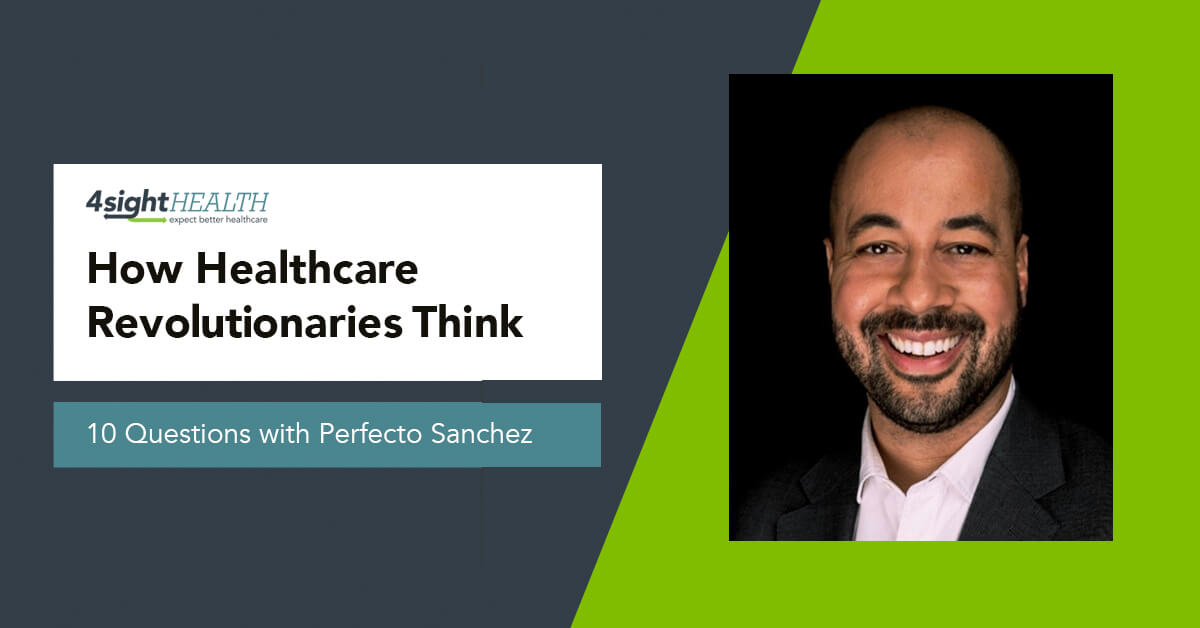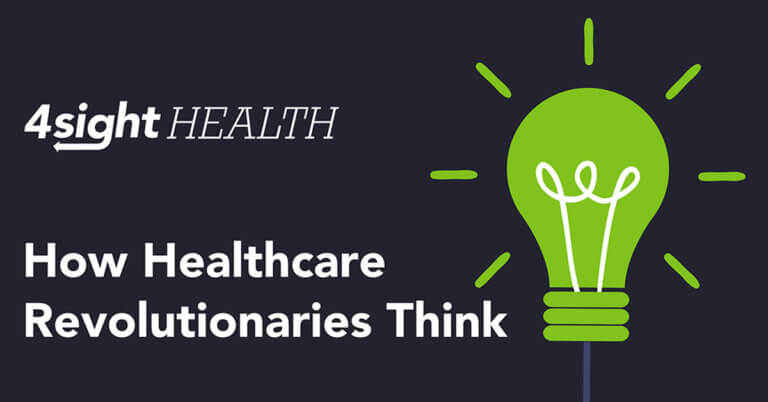April 22, 2025

How Healthcare Revolutionaries Think: 10 Questions with Perfecto Sanchez
Welcome to the latest installment of 4sight Health’s series, How Healthcare Revolutionaries Think. Our interview series profiles healthcare instigators who believe that outcomes matter, customers count and value rules.
Outcomes matter to Perfecto Sanchez, whether it’s on the battlefield in Iraq or in healthcare in the U.S. Sanchez is the cofounder and chief growth officer of Equity Quotient. Launched in 2022, the New York-based company offers health systems, health plans and health-related not-for-profits and foundations a data and analytics platform to manage their population health initiatives. A core functionality of the platform is the capability to identify health disparities and inequities in patient populations.
I talked with Sanchez about his military service and how that experience has translated into this work at Equity Quotient. We also talked about his jump into healthcare and how the new administration’s anti-DEI agenda is affecting his business model.
You can also listen to my podcast interview with Sanchez about his personal healthcare experiences and why they drive his goal of making the healthcare system work for all regardless of race, ethnicity, gender or sexual orientation.
1. We’ll start with the question we ask everyone. Your definition of a healthcare revolutionary. If we looked up that term in the Perfecto Sanchez dictionary, what would it say under that entry?
Sanchez: It’s a great question. What’s wild about the concept of a revolutionary for me is how much it depends on what side of history you’re on. Take the word “equity,” for example. You say “equity” in an operating room today, and as far as the current administration is concerned, you’re a problem. You say “equity” in a boardroom, especially if you’re talking about private equity, suddenly you’re a hero. The same words mean different things in different contexts and, again, what side of history that you’re on. Right now, someone saying you’re a “revolutionary” could get you deported. I define a healthcare revolutionary as someone who sees the healthcare system not as it is, but as it could be, and decides to do something about it.
2. What’s the trigger? That’s another word that means different things to different people. A lot of people see the healthcare system for what it is, but few people are triggered to do something about it. What do you think flips that switch for healthcare revolutionaries?
Sanchez: I think it’s the belief in their vision of what the healthcare system could be. It’s someone who challenges the status quo, is relentless and has this vision for a more accessible and sustainable future for healthcare. There has to be something different, something better, from the norm we have now.
3. Do you have a favorite healthcare revolutionary? Someone who fits the definition? Past or present?
Sanchez: I do, but I’m going outside of the box with this one. I’m not sure if you know who Muhammad Yunus is. He’s the founder of Grameen Bank, which is based in Dhaka, Bangladesh. The bank offers small loans to the poor without requiring collateral. The reason why I love him — I worked a bit with him in the past — is that he didn’t start by trying to change healthcare. He started by giving small loans to people traditionally overlooked by lenders. Mostly women.
 Over the past four decades, Grameen has dispersed over $40 billion to more than 10 million borrowers around the world. They have a remarkable 96% repayment rate. This tells me it’s not just about financial success. It’s about human potential when given the chance. Many of the borrowers, particularly women, went on to found businesses aimed at improving access to healthcare services for women and children.
Over the past four decades, Grameen has dispersed over $40 billion to more than 10 million borrowers around the world. They have a remarkable 96% repayment rate. This tells me it’s not just about financial success. It’s about human potential when given the chance. Many of the borrowers, particularly women, went on to found businesses aimed at improving access to healthcare services for women and children.
Yunus just didn’t move capital. He really moved systems. That’s the type of work that we need to do in healthcare. We need to see how interconnected everything is and start fixing small things that can lead to big, positive changes.
4. Do you consider yourself a healthcare revolutionary?
Sanchez: It’s not a title I’d give myself. I think a lot about what the military taught me. It’s this concept of being wherever I need to be on the battlefield to have an impact. Wherever I need to be or what I need to be to drive change. Being a health tech entrepreneur is so hard. It’s lonely. It’s scary. But I know it can have a really big impact on society. That’s why I do what I do. I’m beyond grateful for the opportunity. I feel so fortunate. I wouldn’t have it any other way. I’m willing to do the work.
5. You’re a graduate of West Point. You served in the U.S. Army for nearly six years. What experiences or lessons from that experience do you bring to work every day at Equity Quotient?
Sanchez: I didn’t have this grand vision of what the military would be like when I joined. 9/11 happened my freshman year at West Point. I graduated in 2005 and was deployed to Ramadi, Iraq, just outside of Fallujah, which later was coined the most dangerous city in the world. I thought that I was going to die. I only found peace in recognizing that there was something worse than dying, which was letting my team down. I was their platoon leader. What I really learned in the military and throughout my service are the ideas of faith, hope and doing the hard work when chaos is all around you. Leaving the military was one of the hardest decisions I ever made. But I made a promise to my soldiers, because I was leaving them behind, that whatever I did next, I would make it count. I could be doing anything right now. But I chose to swim upstream in healthcare. Working in health equity is my way of continuing my service to this country.
6. You obviously had a lot of aha moments in the military and certainly on the battlefield. What was your aha moment in healthcare that told you there’s a systemic health equity problem in healthcare?
Sanchez: I’m not native to healthcare. I am a big believer in data and storytelling. I read this study that said 60% of our health outcomes are determined by our ZIP codes. It made me think of my own story. I grew up in Harlem during the 1980s crack epidemic. I’m a product of a single-mother household. I grew up in Section 8 housing. We got food stamps. The data would say that kids like me are 26% less likely to go to college. Comparing my ZIP code with Westchester, New York, you’d expect my life expectancy to be 20 years, more or less. It was the data that made me decide to cofound Equity Quotient. I had no explicit vision to work in healthcare.
7. Your trigger was a study. Not all impulse decisions work out. We know why you got into healthcare. What is making you stay in healthcare?
Sanchez: What I love about healthcare is the idea of health equity. Equity is a word that’s so polarizing. In healthcare, the more we can understand these disparities that I grew up with and experienced in my own life, if we can frame it with data in a way to capture the value of improving outcomes and lowering costs, healthcare is a system with the greatest opportunity to make the biggest impact. Healthcare is the next frontier of change where we can actually have the biggest impact in this country. It’s a continuation of my service in the military in service of America. Go where I can be the biggest help. Be where I need to be on the battlefield. My battlefield is now healthcare.
8. I’m going to borrow your imagery here. What makes data your weapon of choice on the battlefield of healthcare where you’re participating now?
Sanchez: Data is an objective form of truth. It’s not perfect. But data can really ground us. It can show us what’s working and what’s not working. When we use it with the right intent, data lets us apply pressure and to have hope. It helps us chart a path for what’s possible. Data can help us break bad habits as well.
When you see a disparity, it’s not hopeless. The data helps you see hope, see opportunities. The data is telling us a story. It can point us in the direction of what we can actually fix, where the critical points are and where we can have the greatest leverage. I think it was Archimedes who said, “Give me a lever long enough and a fulcrum on which to place it, and I shall move the world.”
9. How has the Trump administration’s anti-DEI agenda affected your business? Has it made it harder? Easier? Are you having different kinds of conversations with your clients and prospects?
Sanchez: It’s a scary time. It’s disturbing. The government is deleting data sets, changing data sets and removing data on race and gender. None of that makes health disparities go away. It just reinforces the narrative they want to tell. But health systems still need the data. Health insurance companies still need the data. I’ll call it the Forrest Gump effect. A really big hurricane has hit our market, and the hurricane destroyed all the shrimp boats. But people still need their shrimp. And we have shrimp.
The administration can be against DEI all it wants, but the facts still remain. When health systems come to us, and we are in conversations with them even in the reddest of states, what they care about most is serving their patients. If the data can help them better serve their patients and the cost of care to create a more sustainable society, we can help them deliver on that.
10. Let’s go down the seafood menu from shrimp to fish. You say you’re a terrible fly fisherman. I tried flyfishing once. Once was enough, at least until I retire and have time to learn. You still flyfish. Why?
Sanchez: Flyfishing is a great way to stay humble. You never really know what you’re doing. It forces me to listen to my environment. The weather. The temperature. The fish. The hatch. It’s a humble reminder that I’m always learning and aspiring to find that peace and that balance.
Burda’s Final Brief
I’ve never served in the military, but I have the utmost respect for those who have, do and will. They are why I am free to sit comfortably in my home office writing this piece or anything else I want to write about. What I’ll remember most from my interview with Sanchez is his motto of being wherever he needs to be on the battlefield to have the biggest positive impact on the outcome. Today, that battlefield pits the healthcare industry’s efforts to improve health equity and reduce health disparities against the Trump regime’s efforts to destroy diversity, equity and inclusion. Sanchez is right where he needs to be to have the biggest positive impact on the outcome of that battle. He has 4sight Health’s full support.
Perfecto Sanchez is a proven executive dedicated to building business solutions that drive measurable impact. An Iraq War Veteran turned entrepreneur, Perfecto believes in making “doing good” more accessible. He is currently on a mission to shape the future of inclusive AI as the cofounder and Chief Growth Officer for Equity Quotient.
Equity Quotient is a population health data and analytics platform that improves outcomes, elevates quality, and helps lower the cost of care. They do this by aggregating diverse datasets, running proprietary analytics, and automating reporting to transform complex information into clear, actionable insights.
Read more interviews with healthcare revolutionaries
Healthcare Revolutionary Kemena Brooks
Healthcare Revolutionary Katie Kaney
Healthcare Revolutionary Hal Andrews
Healthcare Revolutionary Julie Murchinson
Healthcare Revolutionary David Terry
Healthcare Revolutionary Matt Marek
Healthcare Revolutionary Mark Engelen
Healthcare Revolutionary Chris Johnson
Healthcare Revolutionary Ramona Wallace, D.O.
Healthcare Revolutionary Alejandro Quiroga, M.D.
Healthcare Revolutionary Samir Goel
Healthcare Revolutionary Marcus Whitney
Healthcare Revolutionary Demi Radeva
Healthcare Revolutionary Michael Pitt, M.D.
Healthcare Revolutionary Rebeckah Orton
Healthcare Revolutionary Dan Trigub
Healthcare Revolutionary Bruce Brandes
Healthcare Revolutionary Lena Chaihorsky
Healthcare Revolutionary David Nash, M.D.
Healthcare Revolutionary Esther Dyson
Healthcare Revolutionary Meghan Conroy
See if your favorites are included in the series and let 4sight Health’s David Burda know who you consider to be a Healthcare Revolutionary.





